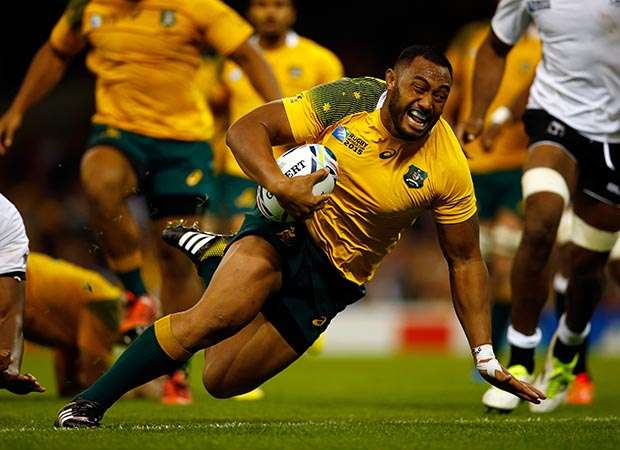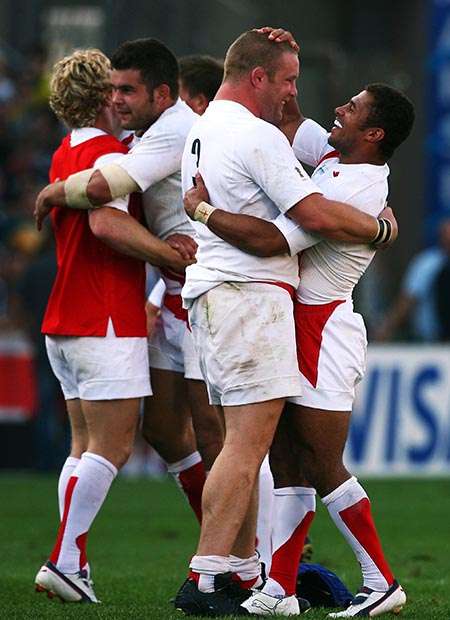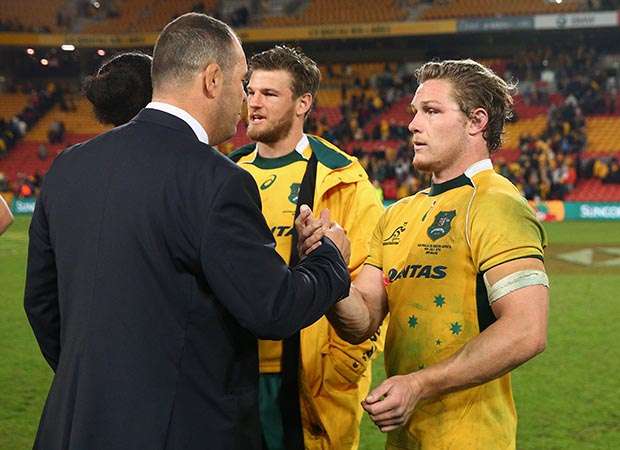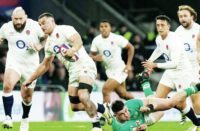 Michael Cheika has not made many slip-ups since his appointment as Wallaby coach last year, but his decision to play down the importance of bonus points after Australia‘s midweek win over Fiji has banana skin written all over it.
Michael Cheika has not made many slip-ups since his appointment as Wallaby coach last year, but his decision to play down the importance of bonus points after Australia‘s midweek win over Fiji has banana skin written all over it.
It is a given that Australia’s coach will have faith in his team’s ability to prevail against England in next Saturday’s make-or-break clash at Twickenham in the ‘Pool of Death’, and then to put paid to Wales. However, the scant regard he has expressed for chasing the bonus points which could decide the group smacked of over-confidence.
Asked if it was frustrating to win without a bonus point, Cheika replied, “We haven’t thought about bonus (points). It’s not Super Rugby. This is the World Cup, you know. One game at a time, just win each game. I haven’t thought about it, to be honest…”
With Australia having scored their third try, through Sekope Kepu, to take a 25-3 lead only only two minutes into the second half, Cheika’s side had 38 minutes to earn themselves a bonus point which would have put them level-pegging after the first round of matches with England and Wales. Yet, instead of going for broke, Australia meandered through the third quarter and, having conceded a try to Fiji, found themselves in a final-quarter dogfight.
Cheika has subsequently backed his stand-in captain Michael Hooper to the hilt for his decision to kick a 69th-minute penalty, rather than go to the corner to secure a fourth try. The Wallaby coach described it as the “logical approach” and, pressed whether he backed Hooper’s call he said: “Yeah, all day.”
It is difficult to take issue with Cheika’s explanation that it was important to “get out beyond two (converted tries) and then do what you can from there”. Subsequent events also made Hooper’s decision look prudent, with Tevita Kuridrani’s sin-binning leaving Australia down to 14 men for the last eight minutes of the match.
However, it was not the Wallaby mindset in the 69th minute that should concern their fans as much as what they were doing in the 27 minutes between Kepu’s try and Bernard Foley’s security-blanket penalty.
Over-confidence has been Australia’s downfall in previous World Cups, in particular in 2007. There have been few sides as cock-sure of victory as the Wallaby outfit that faced England in Marseille in the quarter-finals of that tournament.
Having attended Australia’s team announcement at their Montpellier base a few days prior to the show-stopping upset that followed at the Stade Velodrome, I can vouch that over-confidence oozed from John Connolly’s side. Having seen South Africa blitz England 36-0 in the pool stage, the Wallabies were too relaxed – and they remained that way as they headed for the canvas after being KO’d by the Red Rose underdogs.
 With Andrew Sheridan, Mark Regan and ‘Raging Bull’ Phil Vickery, right, doing a number on the Australian scrum and Lewis Moody heading the charge as England hit the breakdowns ferociously, and in numbers, the favourites were dumped out of the tournament, losing 12-10 as Jonny Wilkinson turned the pressure into points with four penalties. Until that point, the Wallaby pack had coasted through their pool unbeaten and had enjoyed the luxury of committing only a couple of players to the breakdown, and being untroubled at the scrum.
With Andrew Sheridan, Mark Regan and ‘Raging Bull’ Phil Vickery, right, doing a number on the Australian scrum and Lewis Moody heading the charge as England hit the breakdowns ferociously, and in numbers, the favourites were dumped out of the tournament, losing 12-10 as Jonny Wilkinson turned the pressure into points with four penalties. Until that point, the Wallaby pack had coasted through their pool unbeaten and had enjoyed the luxury of committing only a couple of players to the breakdown, and being untroubled at the scrum.
In the aftermath, there were swarms of Wallaby fans wandering the streets of Marseille in stunned disbelief. Moody reflected later: “Our focus was that every time we got into contact we would flood the breakdown…they were not ready for us – and Vickery, Regan and Sheridan were so dominant in the scrum. Sheridan was an absolute machine that day. He destroyed them.”
England captain Vickery also offered this insight into the last World Cup meeting between the teams: “George Gregan was having a go at me in the early stages after I gave a few penalties away – and it wasn’t about me being fat for a change. He was saying ‘Thanks for the leg-up mate, didn’t realise you were going to make it this easy for us’. Then things started to change. We were hammering them in the scrum. We did everything that we practised on the training field, and we absolutely battered them. I don’t like seeing other people suffer, but I love seeing an Australian disappointed, and I remember seeing George on the field, on his haunches, tears running down his face. I’ve got a lot of respect for him, but I knew they were on the next flight home. That made my day.”
There are no survivors from that meeting in the 2015 England squad, other than assistant coaches Graham Rowntree, Andy Farrell and Mike Catt. However, there are five in Cheika’s outfit, including such luminaries as captain/hooker Stephen Moore, Matt Giteau, Adam Ashley-Cooper, Drew Mitchell and Wycliff Palu.
Their presence alone should ensure that the Wallabies do not get ahead of themselves in the build-up to the next instalment of Anglo-Australian World Cup hostilities. Their 26-17 defeat by England at Twickenham almost a year ago will also be a deterrent, especially as England’s scrum once more exposed flaws in Australia’s technique.
Red Rose dominance yielded two tries for Ben Morgan – but the composition of the England pack that day could be significantly changed by the time they face Australia again on Saturday. With Billy Vunipola getting the nod at No.8 ahead of Morgan for the Wales game, the Gloucester man could have his work cut out to regain the starting slot.
While Joe Marler remains top of the loose-head rankings, there are numerous other alterations. Matt Mullan, who came off the bench for Marler, is surplus to requirements, as is hooker Dylan Hartley, for disciplinary reasons. David Wilson, who was the starting tight-head, is now understudy to Dan Cole, while the powerful Dave Attwood, who was at right-side lock, is another absentee after being cut from the squad following the training camp.
 Meanwhile, the main switch behind the scrum against the Aussies last November, which saw George Ford given his second start at fly-half ahead of Owen Farrell, was reversed last week with the Saracens 10 promoted to the starting line-up against Wales after spending the best part of a year on the bench. Even allowing for the changes in England’s pack personnel, since then the Australian scrum appears to have made considerable headway under the tutelage of former Pumas hooker Mario Ledesma.
Meanwhile, the main switch behind the scrum against the Aussies last November, which saw George Ford given his second start at fly-half ahead of Owen Farrell, was reversed last week with the Saracens 10 promoted to the starting line-up against Wales after spending the best part of a year on the bench. Even allowing for the changes in England’s pack personnel, since then the Australian scrum appears to have made considerable headway under the tutelage of former Pumas hooker Mario Ledesma.
Their respective showings against Fiji – who shunted England off one of their own five-metre put-ins – suggested the host nation are unlikely to enjoy a substantial scrum advantage, and certainly nothing akin to that achieved by Vickery and company eight years ago in Marseille.
Since then, Scott Sio has emerged as a Wallaby loose-head to be reckoned with, while Kepu, as well as being a handful on the hoof, has developed into a more solid tight-head.
The Wallaby line-out drive also has more shape and dynamism to it than previously, as David Pocock’s two tries against the Fijians underlined. England will have to be on their guard, or they could come second best in an area which the versatile Pocock has turned into his personal fiefdom. Nor is that the sum of what Pocock brings to the Australian cause, whether at openside or as a compact No.8.
Where England dominated the breakdown against the Wallabies in Marseille, they will have to play at their optimum as a collective if they are to get the better of the openside double-trouble that Pocock will bring to the tackle area if he is paired with Hooper in the Aussie backrow.
Cheika looks poised to use them in tandem again, just as he did against Fiji, and in Australia’s recent Rugby Championship win over New Zealand. The combination of these two breakdown burglars could make life very difficult for England, because Pocock and Hooper are capable not only of turning off the opposition’s supply of quick ball, but also of ensuring that the taps are fully open when it comes to feeding their own backline. To add to the turn-over threat they pose, both are fast, powerful carriers in their own right.
If Pocock and Hooper are given free rein, then there is every chance a backline laced with class from the veteran Giteau to the supersonic Israel Folau at full-back, will find gaps and space to exploit.
The acid test will be whether England any longer have a pack capable of knocking Australia out of their stride, both at the set-piece and in the loose, as Vickery’s crew did at the Stade Velodrome for an against-the-odds victory that is still etched in the memory.
























